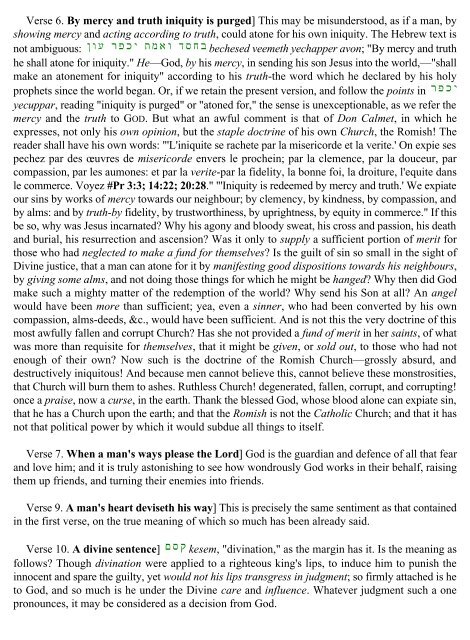Clarke's Commentary - Proverbs - Song Of ... - Media Sabda Org
Clarke's Commentary - Proverbs - Song Of ... - Media Sabda Org
Clarke's Commentary - Proverbs - Song Of ... - Media Sabda Org
You also want an ePaper? Increase the reach of your titles
YUMPU automatically turns print PDFs into web optimized ePapers that Google loves.
Verse 6. By mercy and truth iniquity is purged] This may be misunderstood, as if a man, by<br />
showing mercy and acting according to truth, could atone for his own iniquity. The Hebrew text is<br />
not ambiguous: bechesed veemeth yechapper avon; "By mercy and truth<br />
he shall atone for iniquity." He—God, by his mercy, in sending his son Jesus into the world,—"shall<br />
make an atonement for iniquity" according to his truth-the word which he declared by his holy<br />
prophets since the world began. Or, if we retain the present version, and follow the points in<br />
yecuppar, reading "iniquity is purged" or "atoned for," the sense is unexceptionable, as we refer the<br />
mercy and the truth to GOD. But what an awful comment is that of Don Calmet, in which he<br />
expresses, not only his own opinion, but the staple doctrine of his own Church, the Romish! The<br />
reader shall have his own words: "'L'iniquite se rachete par la misericorde et la verite.' On expie ses<br />
pechez par des œuvres de misericorde envers le prochein; par la clemence, par la douceur, par<br />
compassion, par les aumones: et par la verite-par la fidelity, la bonne foi, la droiture, l'equite dans<br />
le commerce. Voyez #Pr 3:3; 14:22; 20:28." "'Iniquity is redeemed by mercy and truth.' We expiate<br />
our sins by works of mercy towards our neighbour; by clemency, by kindness, by compassion, and<br />
by alms: and by truth-by fidelity, by trustworthiness, by uprightness, by equity in commerce." If this<br />
be so, why was Jesus incarnated? Why his agony and bloody sweat, his cross and passion, his death<br />
and burial, his resurrection and ascension? Was it only to supply a sufficient portion of merit for<br />
those who had neglected to make a fund for themselves? Is the guilt of sin so small in the sight of<br />
Divine justice, that a man can atone for it by manifesting good dispositions towards his neighbours,<br />
by giving some alms, and not doing those things for which he might be hanged? Why then did God<br />
make such a mighty matter of the redemption of the world? Why send his Son at all? An angel<br />
would have been more than sufficient; yea, even a sinner, who had been converted by his own<br />
compassion, alms-deeds, &c., would have been sufficient. And is not this the very doctrine of this<br />
most awfully fallen and corrupt Church? Has she not provided a fund of merit in her saints, of what<br />
was more than requisite for themselves, that it might be given, or sold out, to those who had not<br />
enough of their own? Now such is the doctrine of the Romish Church—grossly absurd, and<br />
destructively iniquitous! And because men cannot believe this, cannot believe these monstrosities,<br />
that Church will burn them to ashes. Ruthless Church! degenerated, fallen, corrupt, and corrupting!<br />
once a praise, now a curse, in the earth. Thank the blessed God, whose blood alone can expiate sin,<br />
that he has a Church upon the earth; and that the Romish is not the Catholic Church; and that it has<br />
not that political power by which it would subdue all things to itself.<br />
Verse 7. When a man's ways please the Lord] God is the guardian and defence of all that fear<br />
and love him; and it is truly astonishing to see how wondrously God works in their behalf, raising<br />
them up friends, and turning their enemies into friends.<br />
Verse 9. A man's heart deviseth his way] This is precisely the same sentiment as that contained<br />
in the first verse, on the true meaning of which so much has been already said.<br />
Verse 10. A divine sentence] kesem, "divination," as the margin has it. Is the meaning as<br />
follows? Though divination were applied to a righteous king's lips, to induce him to punish the<br />
innocent and spare the guilty, yet would not his lips transgress in judgment; so firmly attached is he<br />
to God, and so much is he under the Divine care and influence. Whatever judgment such a one<br />
pronounces, it may be considered as a decision from God.
















